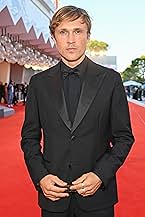Relata la vida de un joven en el tumultuoso Nápoles de los años ochenta. Una historia sobre el destino y la familia, los deportes y el cine, el amor y la pérdida.Relata la vida de un joven en el tumultuoso Nápoles de los años ochenta. Una historia sobre el destino y la familia, los deportes y el cine, el amor y la pérdida.Relata la vida de un joven en el tumultuoso Nápoles de los años ochenta. Una historia sobre el destino y la familia, los deportes y el cine, el amor y la pérdida.
- Dirección
- Guionista
- Elenco
- Nominado a 1 premio Óscar
- 32 premios ganados y 66 nominaciones en total
Betty Pedrazzi
- Baronessa Focale
- (as Betti Pedrazzi)
- Dirección
- Guionista
- Todo el elenco y el equipo
- Producción, taquilla y más en IMDbPro
Opiniones destacadas
For a reason I could never understand, everyone expected a "Rome" from Sorrentino. And out of every 5 reviews written about this movie, 4 of them mentioned the movie 'ROMA'.
Sorrentino made his own 'È stata la mano di Dio' rather than his own Rome, and he did it well.
I didn't want to watch this movie without a proper copy, when Netflix came to my rescue.
It was a beautiful film with everything from its editing to the role its screenplay plays in storytelling, from the angle choices of the cinematographer to the sometimes exaggerated and everywhere calm performances of the actors.
It's been a long time since I heard Italian "in a good sense" in the cinema.
And it was worth the wait.
Sorrentino made his own 'È stata la mano di Dio' rather than his own Rome, and he did it well.
I didn't want to watch this movie without a proper copy, when Netflix came to my rescue.
It was a beautiful film with everything from its editing to the role its screenplay plays in storytelling, from the angle choices of the cinematographer to the sometimes exaggerated and everywhere calm performances of the actors.
It's been a long time since I heard Italian "in a good sense" in the cinema.
And it was worth the wait.
"Cinema is a distraction, reality is second-rate." Fellini (overheard in in this movie)
As Oscar-winning director Paolo Sorrentino's stand-in, Fabietto (Filippo Scotti), comes of age in The Hand of God, he experiences the vagaries and beauties of Neapolitan life, not the least of which is his growing love of cinema. While half way through he will experience a life-changing tragedy, he will throughout be an observer of Naples with its Fellini-like freaks and gorgeous gulf-coast scenery. In a way, this is Sorrentino's Amarcord.
The Hand of God is a title derived from the description of soccer god, Diego Maradona, and his magical, controversial goal in the 1986 World Cup quarterfinal. It also could refer to the Sistine Chapel's fingers, and many other references that bolster this luminous description of Sorrentino's early life in Naples.
When Fabietto sees his aunt, Patrizia (Luisa Ranieri), naked on occasion, Sorrentino shows the emerging appreciation of sexuality in a young-man's sensibility and the parallel lushness of Italy, whose food is legendary and sensuality eternal. Both his older brother Marchino (Marlon Joubert) and he are transfixed by the eroticism, which undoubtedly creeps into all of Sorrentino's work.
Patrizia fuels the erotic fantasies of Fabietto and his older brother Marchino (Marlon Joubert), an aspiring actor too conventionally handsome to be of interest to the great Fellini.
It's as if Sorrentino is saying that these images helped him form his cinematic persona and lifelong affection for his youth in a culturally-rich country. The appearance of a Neapolitan folklore hero, a child monk in a sumptuous palazzo with a deteriorating chandelier, is just one of the many images Sorrentino uses to emphasize the wealthy culture he grew up in.
In addition to the tragedy, Fabietto is most moved by an encounter at a shoot in the historic Galleria Umberto I with director Antonio Capuano (Ciro Capano), his future mentor, who explains cinema with a hard-nosed philosophy that incorporates individuality as the driving force. Upon giving himself to courage and perseverance, as director Capuano advises, Fabio will be a hope of Italian cinema, incorporating the lyrical jumble of happy images from his tender youth to the contemplative awareness in his growing years.
From the Felliniesque characters of his youth-circus-like fat women, goddess-like nymphs, and bold friends like Armando (Biaggio Manna-a John Belushi type), Fabio will break the bounds of domestic life and teen-age longings to strike out into a cinematic world that promises to be at least a distraction rather than a second-rate experience.
Sorrentino has been touched by the hand of God.
As Oscar-winning director Paolo Sorrentino's stand-in, Fabietto (Filippo Scotti), comes of age in The Hand of God, he experiences the vagaries and beauties of Neapolitan life, not the least of which is his growing love of cinema. While half way through he will experience a life-changing tragedy, he will throughout be an observer of Naples with its Fellini-like freaks and gorgeous gulf-coast scenery. In a way, this is Sorrentino's Amarcord.
The Hand of God is a title derived from the description of soccer god, Diego Maradona, and his magical, controversial goal in the 1986 World Cup quarterfinal. It also could refer to the Sistine Chapel's fingers, and many other references that bolster this luminous description of Sorrentino's early life in Naples.
When Fabietto sees his aunt, Patrizia (Luisa Ranieri), naked on occasion, Sorrentino shows the emerging appreciation of sexuality in a young-man's sensibility and the parallel lushness of Italy, whose food is legendary and sensuality eternal. Both his older brother Marchino (Marlon Joubert) and he are transfixed by the eroticism, which undoubtedly creeps into all of Sorrentino's work.
Patrizia fuels the erotic fantasies of Fabietto and his older brother Marchino (Marlon Joubert), an aspiring actor too conventionally handsome to be of interest to the great Fellini.
It's as if Sorrentino is saying that these images helped him form his cinematic persona and lifelong affection for his youth in a culturally-rich country. The appearance of a Neapolitan folklore hero, a child monk in a sumptuous palazzo with a deteriorating chandelier, is just one of the many images Sorrentino uses to emphasize the wealthy culture he grew up in.
In addition to the tragedy, Fabietto is most moved by an encounter at a shoot in the historic Galleria Umberto I with director Antonio Capuano (Ciro Capano), his future mentor, who explains cinema with a hard-nosed philosophy that incorporates individuality as the driving force. Upon giving himself to courage and perseverance, as director Capuano advises, Fabio will be a hope of Italian cinema, incorporating the lyrical jumble of happy images from his tender youth to the contemplative awareness in his growing years.
From the Felliniesque characters of his youth-circus-like fat women, goddess-like nymphs, and bold friends like Armando (Biaggio Manna-a John Belushi type), Fabio will break the bounds of domestic life and teen-age longings to strike out into a cinematic world that promises to be at least a distraction rather than a second-rate experience.
Sorrentino has been touched by the hand of God.
Authenticity and being true to oneself are large factors that define the best filmmakers of any generation. These traits are also what define Paolo Sorrentino's new film THE HAND OF GOD, a personal story of a teenager in Naples, Italy who is looking to become his own person within the chaos of an overbearing, yet loving family. Sorrentino claims to have written this film about true events that happened in his childhood, and whether or not this is true, the passion and love for the material shows through the fantastic filmmaking. Much of the first act of the film consists of the younger Sorrentino, played excellently by Filippo Scotti and named Fabietto in the narrative, being drowned out by his family's banter and gossip. The film cements into the audience the nature of the family and of the culture before it focuses in on Fabietto and becomes a personal coming-of-age story.
The very first shot of THE HAND OF GOD is one of the most stunning of 2021 -- a sweeping helicopter shot of Naples from the sea in front of it, giving viewers a look at the vastness of the city and the extent of the culture before sharing one of the many personal stories from it. THE HAND OF GOD is just as much a film about the city of Naples and the people in it as it is a story about a teenager who has a love for football (soccer in America) and his eventual desire to direct film. Sorrentino understands that his story is just one of many stories from his city that could be told in a film format, and he constantly highlights the great number of supporting characters, showing their issues as well as his own. Supposedly, Alfonso Cuaron's masterful Roma was a major inspiration for Sorrentino's decision to produce this film. Cuaron proved that a specific, personal story could become a successful and acclaimed movie that connects with people on different levels all over the world. THE HAND OF GOD will likely achieve this feat as well, delivering a story that anyone will find something in.
While the culture-specific ramblings of Fabietto's family near the beginning are essential to contextualize the story, they also drag the movie's pacing. Multiple times during the runtime, it is difficult to comprehend what direction the plot seems to be going in, which requires the audience to be patient before any direct characterization or important events kick in. However, Fabietto's story is still an entrancing one full of inspiration, self-discovery and great sadness. The film is full of oddly specific details that could only be told by someone who took those events from lived experiences, and despite the dragging pace is full of a cultural richness that is rare in a movie that crosses over to American audiences. Sorrentino shows the community of the people in Naples, Italy through their shared excitement for football superstar Diego Maradona's transfer to the Napoli club. At times, the people in Naples develop a larger attachment to Maradona than they do to their loved ones and religious beliefs, which shows the importance of community and idolization in the culture of Sorrentino's youth.
By the end, THE HAND OF GOD is a coming of age story first and foremost. The innocent bantering of the first 30 minutes feels years away by the time the final act arrives, similar to how one's first day of high school feels like a lifetime ago after turning 20 years-old. Fabietto's future feels almost within grasp when the movie ends, which is a hopeful irony given the product of his future endeavors is the very film being viewed. Sorrentino's journey back to his childhood is one worth taking, and not just if you can relate to the culture or the specific details of the story. THE HAND OF GOD is a personal story that viewers seldom see in cinemas these days, and more films need to be produced with the same intimate roots and open-minded possibilities.
A-
The very first shot of THE HAND OF GOD is one of the most stunning of 2021 -- a sweeping helicopter shot of Naples from the sea in front of it, giving viewers a look at the vastness of the city and the extent of the culture before sharing one of the many personal stories from it. THE HAND OF GOD is just as much a film about the city of Naples and the people in it as it is a story about a teenager who has a love for football (soccer in America) and his eventual desire to direct film. Sorrentino understands that his story is just one of many stories from his city that could be told in a film format, and he constantly highlights the great number of supporting characters, showing their issues as well as his own. Supposedly, Alfonso Cuaron's masterful Roma was a major inspiration for Sorrentino's decision to produce this film. Cuaron proved that a specific, personal story could become a successful and acclaimed movie that connects with people on different levels all over the world. THE HAND OF GOD will likely achieve this feat as well, delivering a story that anyone will find something in.
While the culture-specific ramblings of Fabietto's family near the beginning are essential to contextualize the story, they also drag the movie's pacing. Multiple times during the runtime, it is difficult to comprehend what direction the plot seems to be going in, which requires the audience to be patient before any direct characterization or important events kick in. However, Fabietto's story is still an entrancing one full of inspiration, self-discovery and great sadness. The film is full of oddly specific details that could only be told by someone who took those events from lived experiences, and despite the dragging pace is full of a cultural richness that is rare in a movie that crosses over to American audiences. Sorrentino shows the community of the people in Naples, Italy through their shared excitement for football superstar Diego Maradona's transfer to the Napoli club. At times, the people in Naples develop a larger attachment to Maradona than they do to their loved ones and religious beliefs, which shows the importance of community and idolization in the culture of Sorrentino's youth.
By the end, THE HAND OF GOD is a coming of age story first and foremost. The innocent bantering of the first 30 minutes feels years away by the time the final act arrives, similar to how one's first day of high school feels like a lifetime ago after turning 20 years-old. Fabietto's future feels almost within grasp when the movie ends, which is a hopeful irony given the product of his future endeavors is the very film being viewed. Sorrentino's journey back to his childhood is one worth taking, and not just if you can relate to the culture or the specific details of the story. THE HAND OF GOD is a personal story that viewers seldom see in cinemas these days, and more films need to be produced with the same intimate roots and open-minded possibilities.
A-
Although I have only an embryonic understanding of Italian, I felt the rhythm and mood of the scenes allowed me to feel the soul of Naples on a cellular level.
Paolo Sorrentino's autobiographical picture follows the filmmaker's stand-in Fabietto (Filippo Scotti) as an introverted teenager in 80s era Naples. His father Saverio (the great Toni Servillo) and Mother Maria (Teresa Saponangelo; quite engaging) live a comfortable life with their other son Marchino (Marlon Joubert). There is also an extended family of colorful relatives and circle of friends. Fabietto can't help but be mesmerized by his bodacious and extroverted aunt Patrizia (Luisa Ranieri).
Sorrentino has never made a secret about his admiration for Federico Fellini and the first half of the picture is clearly designed with the Maestro's masterpiece AMARCORD in mind. Instead of the rise of Mussolini as a backdrop that ties the vignettes together, here it's the arrival of soccer great Diego Maradona who signs with Napoli and becomes a local legend (the title is in reference to his most famous play). It's when things get more serious in the second half where one sees what inspired Sorrentino to tell such a personal tale. Fabietto is faced with having to truly grow up - and, in a hurry. To decide what his future may be. The anecdotes and episodes continue to be serio-comic and filled with often over the top details. It's very much in the vein of Fellini's early classic, I VITELLONI.
Actor Scotti does very well in trying to channel Sorrentino's alter-ego. He has a natural presence and he does what he can to give the viewer a reason to care about his life. Still, Sorrentino's screenplay never quite unites all of its various threads into a cohesive narrative. We only see snippets of Fabietto's interest in cinema. Not only is Fellini mentioned, but so are other major Directors of Italian cinema such as Franco Zefferelli and Sergio Leone. But, it is local Neapolitan filmmaker Antonio Capuano (played by Ciro Capano) who gives young Fabietto some important but stern advice (Capano became a mentor to Sorrentino). It's a strong sequence, but, far too little and too late in the proceedings to anchor the movie. Just because a film is 'from the heart' doesn't mean it translates well to the screen. One has to invite in the viewer. Here, far too much of it plays like Sorrentino's personal notebook. It's vividly produced with some very fine cinematography by Daria D'Antonio and it has a lively cast, but, it never truly sings. HAND OF GOD gives the viewer some insight into Sorrentino's past, but, it never quite fully connects.
Sorrentino has never made a secret about his admiration for Federico Fellini and the first half of the picture is clearly designed with the Maestro's masterpiece AMARCORD in mind. Instead of the rise of Mussolini as a backdrop that ties the vignettes together, here it's the arrival of soccer great Diego Maradona who signs with Napoli and becomes a local legend (the title is in reference to his most famous play). It's when things get more serious in the second half where one sees what inspired Sorrentino to tell such a personal tale. Fabietto is faced with having to truly grow up - and, in a hurry. To decide what his future may be. The anecdotes and episodes continue to be serio-comic and filled with often over the top details. It's very much in the vein of Fellini's early classic, I VITELLONI.
Actor Scotti does very well in trying to channel Sorrentino's alter-ego. He has a natural presence and he does what he can to give the viewer a reason to care about his life. Still, Sorrentino's screenplay never quite unites all of its various threads into a cohesive narrative. We only see snippets of Fabietto's interest in cinema. Not only is Fellini mentioned, but so are other major Directors of Italian cinema such as Franco Zefferelli and Sergio Leone. But, it is local Neapolitan filmmaker Antonio Capuano (played by Ciro Capano) who gives young Fabietto some important but stern advice (Capano became a mentor to Sorrentino). It's a strong sequence, but, far too little and too late in the proceedings to anchor the movie. Just because a film is 'from the heart' doesn't mean it translates well to the screen. One has to invite in the viewer. Here, far too much of it plays like Sorrentino's personal notebook. It's vividly produced with some very fine cinematography by Daria D'Antonio and it has a lively cast, but, it never truly sings. HAND OF GOD gives the viewer some insight into Sorrentino's past, but, it never quite fully connects.
¿Sabías que…?
- TriviaAccording to Paolo Sorrentino, it was Alfonso Cuarón's Roma (2018), which was based on Cuaron's childhood in Mexico City, that gave Sorrentino permission to commit his own experience to film. For Sorrentino realized that "a personal, private film could tell a universal story."
- Citas
Antonio Capuano: Remember, those without courage don't sleep with beautiful women.
- Bandas sonorasNapule è
Written and performed by Pino Daniele
Selecciones populares
Inicia sesión para calificar y agrega a la lista de videos para obtener recomendaciones personalizadas
- How long is The Hand of God?Con tecnología de Alexa
Detalles
- Fecha de lanzamiento
- Países de origen
- Sitio oficial
- Idiomas
- También se conoce como
- The Hand of God
- Locaciones de filmación
- Productoras
- Ver más créditos de la compañía en IMDbPro
Taquilla
- Presupuesto
- EUR 13,049,974 (estimado)
- Total a nivel mundial
- USD 167,909
- Tiempo de ejecución2 horas 10 minutos
- Color
- Mezcla de sonido
- Relación de aspecto
- 2.39 : 1
Contribuir a esta página
Sugiere una edición o agrega el contenido que falta

Principales brechas de datos
What was the official certification given to Fue la mano de Dios (2021) in Canada?
Responda

































